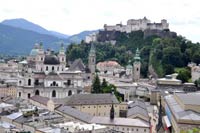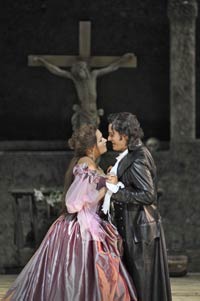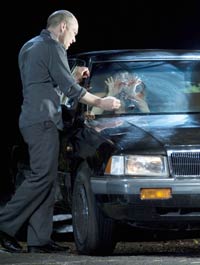Salzburg Festival 2010
Ninety years old… and still going strong!
By Irving Spitz

 |
Views of Salzburg
© Irving Spitz |
|
Elektra
Orest (René Pape), Klytämnestra (Waltraud Meier)
© Hermann und Clärchen Baus
|
 |
Roméo et Juliette
Anna Netrebko (Juliette) / Piotr Beczala (Roméo)
© Hermann, Clärchen & Matthias Baus
|
 |
Don Giovanni
Don Giovanni (Christopher Maltman), Donna Anna (Aleksandra Kurzak)
© Salzburger Festspiele / Monika Rittershaus
|
This year the elitist Salzburg festival celebrated its 90th anniversary. The festival is probably one of the last remaining bastions of old world elegance. Even in matinee performances, women are often attired in long evening dresses and men in tuxedos. The original idea to establish this festival was conceived by an illustrious trio comprising composer Richard Strauss, stage director Max Reinhart and the novelist, librettist and poet, Hugo von Hofmannsthal. To celebrate this milestone, the Salzburg museum mounted an exhibition tracing the festival’s historical high points. Even the festival’s low point, that dark Nazi period between 1938 and 1945, was chronicled in detail.
As usual, operas featured prominently. This included a new production of Elektra which was most appropriate for this anniversary celebration. Strauss attended the premiere performance of von Hofmannsthal’s play Elektra directed by Reinhart in Berlin in 1903. This was the beginning of a most fruitful collaboration between composer and librettist, a partnership lasting over two decades and responsible for 6 operatic masterpieces, the first being Elektra. This macabre plot was taken from the ancient Greek playwright, Sophocles. Elektra plans the death of her mother Clytemnestra and her lover Ageist to avenge the murder of her father, Agamemnon, by Clytemnestra. Elektra’s brother Orest, banished and long thought dead, returns to carry out this task.
The production was mounted by director Nikolaus Lehnhoff. Raimund Bauer’s stark set design comprised a giant irregular concrete cube with intermittent sporadic slits or lookout points functioning as windows. Despite its huge size, the set conveyed the claustrophobic atmosphere. The staging was reminiscent of a prison which is also appropriate since Elektra and her sister Chrysothemis were imprisoned both psychologically and physically in the royal palace. The final scene was both chilling and gruesome. Set in an abattoir with splattered blood smeared on the walls, it revealed the body of the murdered Klytämnestra hanging upside down like an animal carcass with her dead lover lying besides her.
Strauss scored Elektra for a huge orchestra of 111 musicians and the Vienna Philharmonic under the guiding hand of conductor Daniele Gatti played magnificently although in some fortissimo passages, they tended to drown out the singers. One could not ask for a more stellar cast. Elektra was sung by Swedish soprano Irene Theorin. She is on stage for almost the full duration of this one Act opera and was certainly up to the demanding role. Her soaring and searing soprano easily cut through the orchestra and could be clearly heard but she was equally effective in the more dramatic pianissimo passages. Clutching Agamemnon’s coat she portrayed a crazed woman totally possessed with only one thought – to avenge the murder of her father.
Waltraud Meier had the role of Elektra’s deranged mother Klytämnestra, a woman obsessed with her nightmares and desperately seeking reconciliation with Elektra who rejects her overtures. Meier scored a triumph for her portrayal of the role, both vocally and dramatically. The only relatively normal member of this dysfunctional family, Elektra’s younger sister, Chrysothemis, was sung by Dutch soprano, Eva-Maria Westbroek who succeeded in bringing out the pathos and innocence of the role. Especially poignant was her aria when she yearns for a normal life with marriage and children. German bass René Pape sang Orest, and his magnificent sonorous bass easily filled the house. This performance certainly represented one of the highpoints of the festival.
Another new production was Gluck’s Orfeo and Euridice. Director Dieter Dorn and conductor Riccardo Muti opted for the earlier and shorter Vienna version of Gluck’s masterpiece. The performance took place in the giant Grosses Festspielhaus, not the most ideal venue for a Gluck opera. Jürgen Rose’s sets and staging was intriguing. At the beginning of the overture, the newly weds are seen embracing whilst their wedding guests look on. By the overture’s end, Euridice has died, disappearing in a hole in the stage floor leaving the heartbroken Orfeo. The wedding guests change into mourning garb and build a memorial on the grave of the dead Euridice. Orfeo descends a ladder to enter a Hieronymus Bosch-like Hades with mirrors to add to the effect. After their sojourn, the lovers return to earth to be greeted by arguing and fighting married couples. For good measure, a gay pair is also included. The intended message was obvious: married life is not always perfect bliss.
Although the production was intriguing from a general perspective, one was nevertheless left with the impression that the three main vocal soloists were left pretty much to their own devices. Austrian contralto, Elisabeth Kulman, took on the challenging role of Orfeo whilst native-Salzburger, Genia Kühmeier was her Euridice. German soprano Christiane Karg had the role of Amore. These three soloists had to compete with the acoustically treacherous and unsympathetic stage of the Grosses Festspielhaus and often their voices did not carry too well. Riccardo Muti presided in the pit over the Vienna Philharmonic. The orchestra produced their usual expected impeccable playing.
The current festival also featured two remarkable concert performances of Bellini’s Norma with the Camerata Salzburg Orchestra. Conductor Friedrich Haider paced the work rather slowly. Soprano Edita Gruberova had the role of the Druid princess, Norma, and her performance was a real tour de force. I recall hearing her for the first time in 1970 at the Vienna Staatsoper as the Queen of the Night in Mozart’s Magic Flute. It is miraculous that forty years later, her voice still retains its range and beauty. To pull off the taxing role of the Druid princess, one of the most difficult in the whole operatic repertoire, at this stage of her career, represents a remarkable feat. The whole audience, including her father, the Druid leader, Oroveso, was moved by her plea to him to take care of her children after her death. Gruberova was ably supported by the Adalgisa of the talented Joyce DiDonato whose dramatic and beautiful voice added much to the success of the performance. In their poignant duets, both complemented each other resulting in some remarkable singing. The roles of the Roman proconsul Pollione, and the Druid leader Oroveso were taken by tenor Marcello Giordani and bass Ferruccio Furlanetto respectively. Giordani was in good shape but his voice tended to flag as the evening wore on. Furlanetto was in much better form than when I heard him some months ago in Simon Boccanegra at La Scala.
Another memorable operatic event was a revival of Bartlett Sher's 2008 production of Gounod’s Romeo and Juliet. Michael Yeargan’s sets made full use of the spectacular and remarkable Felsenreitschule (Salzburg riding school). The intelligent lighting by Jennifer Tipton, contributed to this effective staging. Catherine Zuber’s costumes were a real delight. Canadian conductor Yannick Nézet-Séguin, recently appointed director of the Philadelphia Orchestra, led the Mozarteum Orchestra in a robust rendering of the score and propelled the action forward. He left no doubt who was in control.
The radiant soprano Anna Netrebko and dashing tenor Piotr Beczala had the star roles. The quality of Netrebko’s voice is darker now than it was a few years ago. I would love to hear her as Desdemona. As Juliet, she put on a most creditable and inspiring vocal performance and as usual her acting was superb. Equal to the task was her Romeo, Piotr Beczala who succeeded in portraying love, compassion, anger and grief. The physical attraction between the young pair was almost palpable. Another inspiring performance was that of Mikhail Petrenko who sang the sympathetic role of Frère Laurent.
Claus Guth’s production of Mozart’s Don Giovanni premiered two years ago and was also revived. Guth has already given the Salzburg audience his version of the Marriage of Figaro and is scheduled to complete the Mozart- DePonte-triology next year with Cosi fan tutte. In Guth’s conception, the opera is set in a forest with a revolving stage. Other interesting twists included a bus stop where we first make the acquaintance of Donna Elvira and a car driven into the stage by Don Ottavio and Donna Anna with Giovanni posing as a mechanic. Both Giovanni and his servant, Leporello were into drink and drugs. Marihuana circulated freely at the Don’s party for Zerlina and Masseto.
The Vienna Philharmonic was conducted by Yannick Nézet-Séguin. He proved himself as adept a conductor of Mozart as he was of Gounod. Indeed this worthy Mozartian was very much on top of things and the orchestra sounded glorious. Best singing came from Erwin Schrott as Leporello and Christopher Maltman as Giovanni. Soprano Aleksandra Kurzak took on the role of Donna Anna and was the strongest of the women. Her great aria “Or sai chi l'onore” (“Now you know”) was one of the highlights of the performance. Dorothea Röschmann as Donna Elvira sounded a little forced at times. Anna Prohaska as the perky peasant, Zerlina, and Adam Plachetka as her disillusioned lover, Masetto, also contributed significantly to the success of this production. Joel Prieto took over the role of Don Ottavio at short notice portrayed the asexual lover of Donna Anna most effectively. In the final banquet scene, the murdered Commendatore, the impressive bass, Dimitry Ivashchenko makes his entrance to dig Giovanni’s grave. This new take on this scene worked well and the opera ended on this note with the death of Giovanni. This production omitted the final sextet. I did feel somewhat deprived for not hearing this wonderful conclusion, but as correctly anticipated by Guth, this would have been inappropriate in this production.
Additional highlights in the current festival included performances of Mahler’s fourth and fifth symphonies by The World Orchestra for Peace under the baton of Valery Gergiev. The impressive soprano soloist in the final movement of the fourth was Camilla Tilling. This illustrious body of hand picked musicians, comprising leading principal players from about 60 international orchestras, was founded by the late Georg Solti in 1995. Since their inception, The World Orchestra for Peace has convened for a concert almost annually. This exercise is clearly an expensive and luxurious undertaking. Considering they meet so infrequently and have minimum rehearsal time, it is surprising how this body of individual musicians blended in so well together. This may be partially explained by the fact that the Salzburg performance was a rerun of their appearance a few days earlier at the BBC proms. All told, the music making was remarkable. Gergiev’s fourth was rather tame but he pulled out all the stops for a fiery interpretation of the fifth. There was glorious playing by strings as well as the wind and brass sections of this impressive ensemble.
I managed to hear some of the weekend Mozart Matinees with the Mozarteum Orchestra of Salzburg. These matinees are an annual feature of the festival which characteristically highlight favorite Mozart showpieces. I was privileged to hear two great sopranos, one well established and the other a relative newcomer. A very pregnant Diane Damrau was inspiring in arias from early Mozart operas including Idomeneo, Mitridate and La finta semplice. As an encore she sang Fiordiligi’s aria “Per pietà, ben mio, perdona” ("Please, my beloved, forgive"), from Cosi fan tutte. Her interpretation and voice was truly extraordinary and she is unquestionably one of the great Mozart sopranos of our time.
In another matinee, the young Russian soprano Julia Lezhneva gave an unforgettable account of Mozart’s Exultate Jubilate carrying off all the exciting vocal pyrotechnics with much assurance and self confidence. She was ably assisted by conductor Marc Minkowski. The program also included some concert arias and as an encore, she sang Susanna’s aria “Deh vieni non tarda” ("Oh come, don't delay") from the last act of Figaro. This is a soprano to be watched. She is destined to have a remarkable career.
Salzburg really comes alive three times a year, during the “Mozart week” in January, at Easter when the Berlin Philharmonic is in town and finally in August during the summer festival. On these occasions it becomes the undisputed musical capital of the world. Obviously equally inspiring and great performances can be heard in London, Paris, Vienna, New York and elsewhere. But there is something so special about this small Austrian town on the banks of the Salzach River. In major cities, after the performance, one rushes for a taxi, bus or train to get home, usually in anticipation of another working day. Here the ambiance is totally different. One leaves the concert venue slowly, exhilarated, contemplating what one has heard. One traverses the cobble lined streets, walks along the river bank with the wonderful panorama of the castle looming over the city to return to the hotel rested and energized……and then voila, one wakens the next day for a further musical experience.
Irving Spitz, Emeritus Professor of Medicine, is an avid traveler and photographer. He writes, reviews and lectures on medical topics, music, art, history and travel. Additional pictures, articles and reviews can be seen at www.irvingspitz.com
